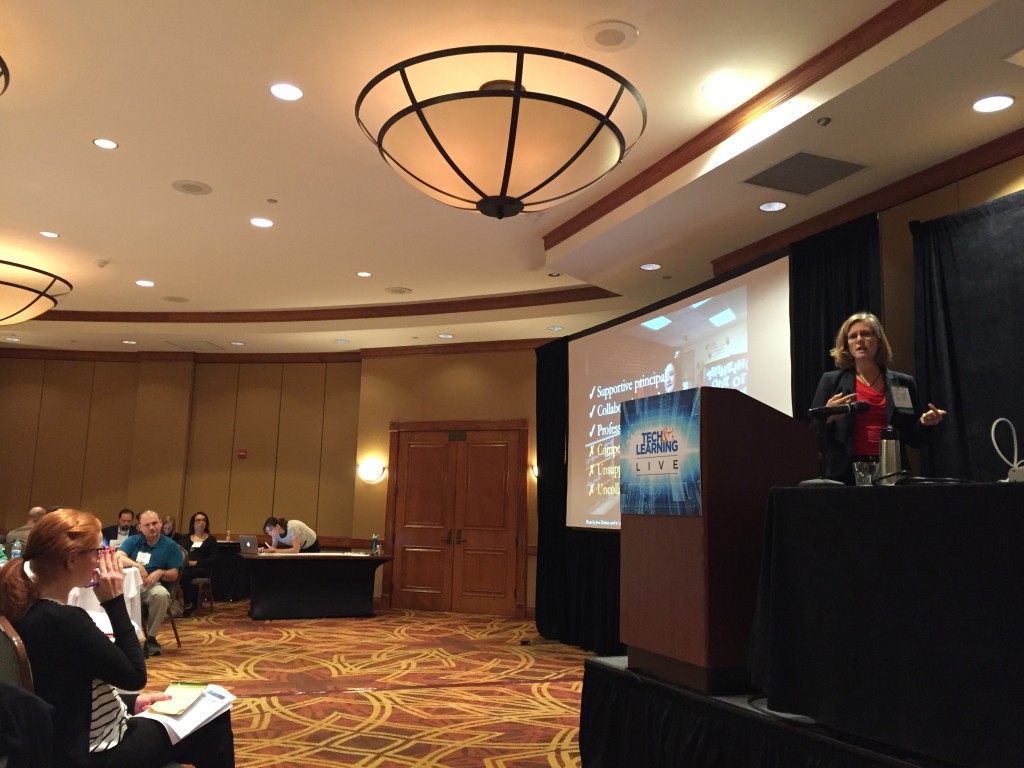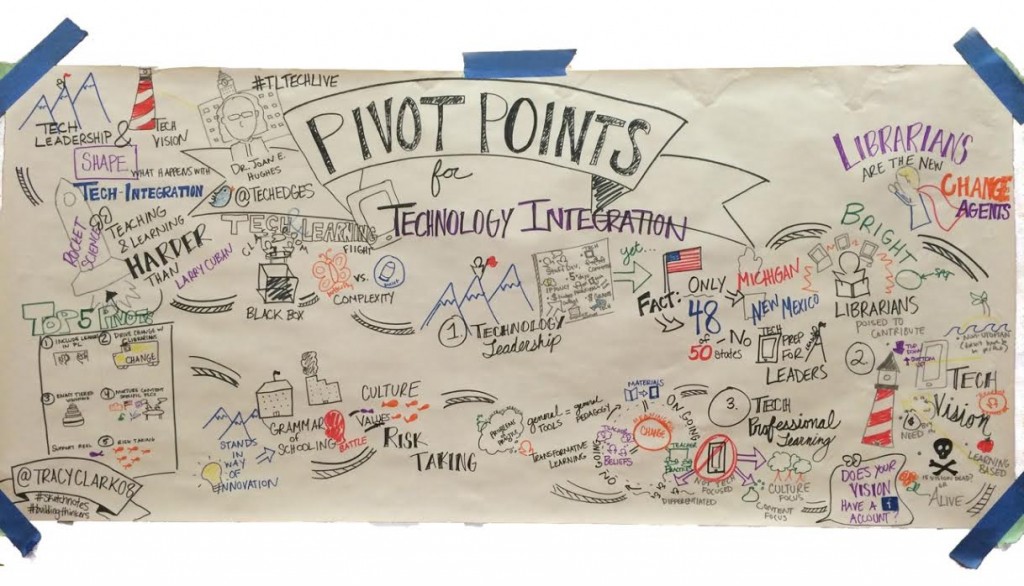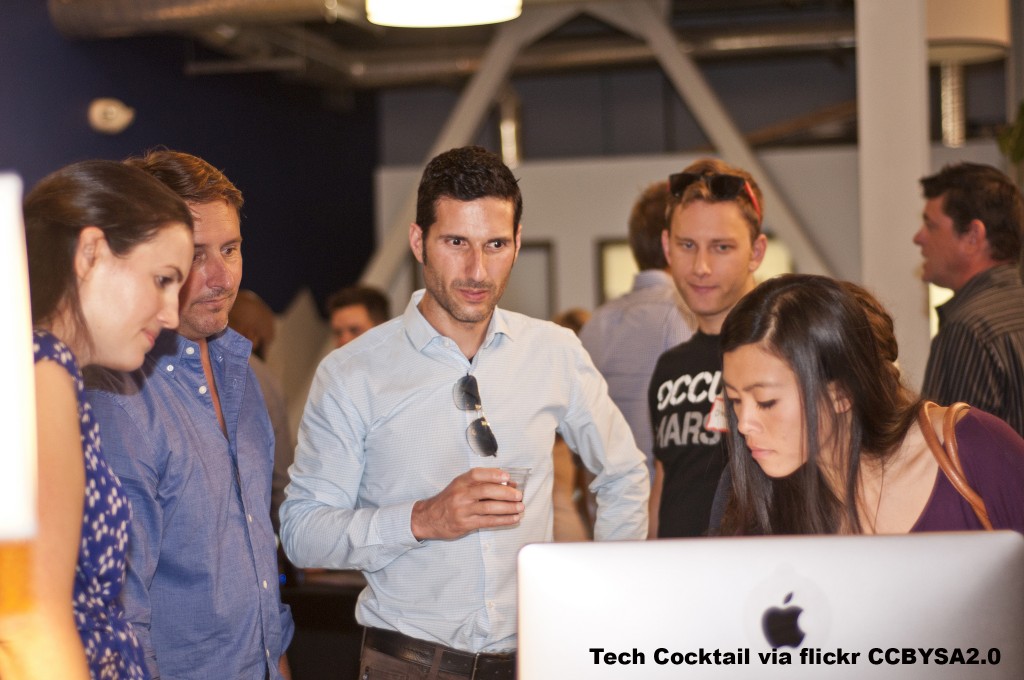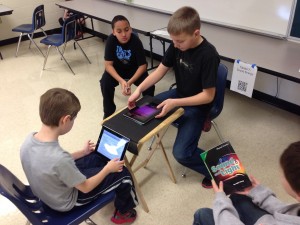Seeking Teachers & Entrepreneurs
Seeking Study Participants: Teachers and Entrepreneurs who Innovate with Technology in or for K-12 Schools
Dr. Joan Hughes and Adam Papendieck, educational researchers from the University of Texas, are conducting research to understand how teachers and entrepreneurs innovate in K-12 schools. We are seeking the following people to participate in our study:
- Teachers who are innovating with technology in K-12 schools (i.e., integrating edtech products to solve educational problems.)
- Teachers, currently teaching in K-12 schools, who have developed edtech products for K-12 schools.
- Teachers, who have taught in K-12, who have developed edtech products for K-12 schools, and who have left the K-12 teaching profession to focus on their edtech product(s)/company for K-12 schools.
- Entrepreneurs/developers/inventors of edtech products or companies who never taught in a K-12 school.
Participating will involve no more than two interviews (about 60 minutes each) in person, by telephone, or via digital conference at a time of your convenience. We hope to learn about how you approach educational innovation, what networks and resources you use in your work, what difficulties you encounter, and how to create positive impact in schools.
We’ve included a consent form (https://goo.gl/fNGtfo) for your review that describes the purpose of the research and conditions for participating. If you would like to participate, please contact Adam Papendieck (apapendieck@utexas.edu).
Thanks for considering this!
Dr. Joan E. Hughes
Associate Professor in Learning Technologies
UT Austin College of Education
Adam Papendieck
Doctoral Student in Learning Technologies
UT Austin College of Education
Countdown to Slow Pitch EdTech Think Tank Summit at SXSWedu
We’ve got about 5 days until we debut the Slow Pitch: An EdTech Design Think Tank Summit at SXSWedu 2016.
Check out our website with details about the schedule, the selected startups, and the mentors: http://slowpitchedu.org
Check out our SXSWedu schedule info and add it to your conference schedule: http://schedule.sxswedu.com/events/event_PP54541
SEE YOU THERE!
SXSWedu Summit – Seeking EdTech Startups to join #SlowPitchEdu
Slow Pitch: An EdTech Design ThinkTank
I am delighted to announce that details and plans for our SXSWedu 2016 Summit are nearly complete! Our very last detail is to find 5 amazingly interesting edtech startups who would like to work towards developing/revising/rethinking a product that can transform teaching and learning in PK-12 subject areas and be successful penetrating the PK-12 market.
You can find all the details at my super specific website: http://slowpitchedu.com
Or, you can just launch into the application right now.
Teachers: Apply to have your POPs be turned into web-based lessons!
Interested in using internet-based resources/tools/software in your teaching of PK-12 subject matter? Don’t have time or don’t know where to start?
Would you like your teaching to look more like the classroom on the left or the right? If you said you are inclined more the right-hand picture where students are exploring sound and recording an audio podcast, then read on…
Let Masters and Ph.D. students in the UTexas Learning Technologies program assist you in designing web-based teaching and learning plans specifically for a problem of practice (POPs) you identify, with the technological resources you have at hand in your school. Not only will you receive a lesson plan(s), but you’ll also receive a research-based rationale for why the plan will positively impact students’ learning.
Complete the following application by Jan 15, 2016 to secure review of your proposal by the class in late January 2016.
By applying you are agreeing that if chosen:
- You will try your hardest to be available via videoconferencing sometime b/w 4:00 – 7:00 PM (CST) on occasional Tuesdays: early February and on April 26 or May 3, 2016.
- You will be available to answer questions via email.
- The learning/lesson plans and research-based rationales will be distributed publicly free of charge with Creative Commons licensing.
5 Pivot Points for Technology Integration
 Yesterday, I keynoted the Tech & Learning Live Austin event. The day was spent considering professional learning and technology integration. In my morning keynote, I shared classroom and school-based research insights on technology integration. Specifically, I talked about how technology leadership, technology vision, and professional learning shape successful technology integration efforts in K-12 schools. The talented Tracy Clark @tracyclark08 sketched the content, which is also included below.
Yesterday, I keynoted the Tech & Learning Live Austin event. The day was spent considering professional learning and technology integration. In my morning keynote, I shared classroom and school-based research insights on technology integration. Specifically, I talked about how technology leadership, technology vision, and professional learning shape successful technology integration efforts in K-12 schools. The talented Tracy Clark @tracyclark08 sketched the content, which is also included below.
I ended the keynote with 5 research-based actions schools can do to pivot towards successful technology integration. They include:
#1: If school leaders must tend to their own technology learning*, we should be inviting them to the professional learning opportunities we arrange in schools and districts. And leaders – you should go! I’ve created opportunities for leaders to engage with actual technology-supported lessons for K-12 learning, and they loved this so much. *Research shows that only 2/50 states require technology preparation course for school leadership degrees, and examination of school leadership curricula reveals 92% of 137 programs do not mention technological courses or preparation. Of the 7%, the technology relates to data-driven decision making, not teaching and learning with technology.
#2: Librarians are the new technology integration change agent*! Use this to your advantage. Hire and cultivate technology-interested librarians and encourage their contributions to your leadership team. *Research shows that librarians contribute to technology leadership activities because of their knowledge of pedagogy, curriculum, technology, and collaboration. Enablers of librarians to do this work include (a) supportive principal, (b) collaborative teachers, and (c) engagement with professional organizations. A disabler is a competitive instructional technologies.
#3: While an optimal technology vision has had input from constituents, not everyone participates in that process*. To increase awareness and buy-in for your technology vision, enact tiered visioning through small groups or PLCs, grade level teams, subject area teams) who develop their own mini technology vision. Think of these mini-visions as a wedding cake – the largest cake bases are built from these small group mini-visions and support and relate to the overarching school or district vision (the top tier). This can enable top-down and bottom-up visioning and enactment at the classroom level. *Research shows more success with technology integration if the technology vision is learner-focused, curricular-focused, and pre-planned in collaboration with stakeholders, such as leaders, technology directors, librarians, teachers, parents, and students. They can emerge from top-down or bottom-up processes as long as the visions are communicated widely and garner buy-in among stakeholders.
#4: Nurture content-specific, ongoing professional learning, such as in professional learning communities (PLCs) that examine problems of practice (POPs)*. If these PLCs have created mini visions (see Pivot #3 above), it’s a logical next step to work on enactment (with support). *To have meaningful, transformative technology integration, research shows the materials (e.g., technologies) must change but that is not sufficient. You must also change teacher beliefs and teacher practices.
#5: If we are asking teachers to change their practices and beliefs, then we must support real risk-taking by working towards cultural change*. *Changing our beliefs and practices will challenge the “grammar of schooling,” which is a school’s engrained educational format and goals. Thus, the kind of change you are working towards will necessitate changes in school culture. School leaders who are successful in technology integration create value and appreciation and support for risk-taking, exploration, and innovation.
This presentation is licensed under a Creative Commons Attribution-NonCommercial-ShareAlike 4.0 International License. Please feel free to share with others, with attribution.
The content of what I spoke about is in the NOTES of the presentation.
 Sketch by Tracy Clark
Sketch by Tracy Clark
SXSWedu summit: Slow Pitch – the new way to develop innovative edtech
UPDATE: Our summit was accepted for SXSWedu 2016! Stay tuned for information on how edtech startups can apply to be one of the featured participants!
There are 85 SXSWedu 2016 proposals with the word “pitch” in their titles. Our 4-hour summit proposal, Slow Pitch: An Edtech Design ThinkTank, brings together educators with amazing ideas, edtech startups, funders, developers, students, teachers, parents, school administrators, school directors of innovation, and educational researchers to do what should be done when pursuing new ideas for education – think hard about the ideas collaboratively. SXSWedu’s icon of a head/brain perfectly fits the goals of our summit.
Best of all – our summit will be highly interactive. While we have a mentor panel, the audience will bring additional perspectives and expertise that is so worthy that you’ll have multiple ways to get your comments, questions, and ideas on the floor during the session. We also will have amply breaks!
Here’s a run-down on our summit, which includes way more details than what’s up on SXSWedu’s proposal. Please vote YES for our summit – to support the development of new edtech that supports, transforms, and penetrates into teaching and learning.
How long do you imagine the summit running?
This would be a half-day summit (4-hours). In anticipation of audience not committing to the entire summit, we have events set up in 30 minute increments (with 5 minute transitions/breaks between each) with the ability for audience feedback (i.e., voting) to occur on a rolling basis. Results will be shown and discussed after each “slowpitchedu” 30-min session but also again at the culmination of the summit. Note that we will not have a “winner” as is typical in most pitch sessions, but instead each edtech startup will emerge with deep ideas and generative feedback from their 30-minute slowpitchedu thinktank session. The outcome for all involved is to learn from the experience, not to select a winner.
What does the timeline within your summit look like?
Workshop in Session
- Introduction (5 minutes)
- to panel mentors and companies
- announce optional tech that will be used during session: twitter, polleverywhere
- clarify the design thinktank summit is intended to bridge across edtech to help emerging edtech advance and innovate.
- Slow Pitch Exhibits (20 minutes)Transition back to tables/seats (allowing 5 minutes)
- Each edtech startup has an exhibit area to share information about their company / ideas/product(s)
- Participants in the session get to talk with them / browse
- Participants in the session can talk with mentors
- Edtech SlowPitchEdu (this is repeated 5 times; once for each participating edtech startup, 30 minutes each)
- Fast pitch 90-second pitch. (2 minutes) [This is mostly to get everyone grounded again; remind everyone in room of the focal company under discussion.]
- Q&A alternating b/w mentors, audience tweet, and audience open mic (25 minutes)
- Mentors ask questions.
- Audience may tweet questions (We will have a graduate student monitor these to pull ones to be asked.) (questions posed by grad student)
- Audience open mic (line can form)
- Final feedback to edtech startup (2 minutes): Startup Response – Response to feedback. (1 minute)
- GoogleForm for audience: final analysis on criteria related to: innovative concept, transforming learning, transforming teaching, potential to penetrate K-12 market
- GoogleForm for mentors only: final analysis innovative concept, transforming learning, transforming teaching, potential to penetrate K-12 market
- Breaks (5 minutes between each edtech startup slowpitchedu, total of 20 minutes)
- Closing: What did the slowpitch edtech design thinktank make you think more about? (30 minutes)
- Mentor comments (1 minute each, allow 13 minutes)
- Startups – comments (1 minute each, 2 min in actuality – allow 7 minutes)
- Audience comments – open mic (1 minute max, 10 minutes)
How many more speakers should we expect?
We are planning to have about 10 panelists, who include student, parent, teacher, school administrator, VC/funder, developer, entrepreneur, researcher.
Mentors: (confirmed)
- Ms. Rafranz Davis, Executive Director of Professional and Digital Learning, Lufkin ISD, Texas
- Dr. Joan Hughes, Ph.D., Associate Professor of Learning Technologies, The University of Texas at Austin
- Dr. Janice Trinidad, Ph.D., Veteran Science Teacher & Instructional Coach, Manor New Tech HS and ThinkForward PBL Institute
- Mr. Marc Wright, 12th grade student, Round Rock High School
- Mr. Eric Silva, Undergraduate Student, Computer Science, University of Texas Rio Grande Valley
- Dr. Gloria Gonzales Dholakia, Ph.D., Parent and Executive Director at Leander ISD Educational Excellence Foundation
- Ms. Carolyn Foote, Librarian, Westlake High School, Austin Texas
- Mr. Lincoln Turner, EdTech Entrepreneur at Wizzimo
- Ms. Angela Lee, Assistant Dean, Columbia Business School, & Founder,37 Angels
EdTech Startups Selection:
We will have an open call for applications for the edtech startup participation in SlowPitch. Criteria for inclusion will require:
- an innovation idea or product for the PK-12 market
- an innovation that targets processes involved in learning or teaching in schools subjects
We will group applicants into three categories of (a) emerging idea, (b) beta product, or (c) tested product. Emerging edtech startups have an idea but have not produced demos or mock-ups. Beta products have functioning products but have not been tested with users. Tested products are functioning and have some user testing completed or perhaps pilot tests conducted. We will randomly choose the edtech startups to invite – ensuring that we have at least one edtech startup in each of the three categories, with the two other selections to be from any of the three categories.
Slow Pitch: An EdTech Design ThinkTank (a 2016 SXSWedu Proposal)
In collaboration with Sean Duffy, founder of the EdTech meetup and co-founder of EdTech Action, an edtech incubator, we developed what we hope will be a transformational summit for all participants and attendees at SXSWedu 2016. We’ve summarized our proposal below and would love your feedback. We still need to get our proposal accepted so stay tuned – later in August, we’ll call upon you to vote for it in panelpicker! If we are lucky to earn a spot at SXSWedu next year, we’ll open up an application process to invite edupreneurs, teacherpreneurs, and edtech startups to apply to participate.
Slow Pitch: An EdTech Design ThinkTank (#slowpitch)
Organizer: Dr. Joan E. Hughes
Moderator: Mr. Sean Duffy
Join an interactive pitch session where startups, mentors and the audience will dialogue and hone startups’ products so that they will transform learning and penetrate school markets. Selected edtech startups (follow @techedges and @dearmrduffy to apply) will provide demos, evidence of real/potential impact, and marketing/monetization plans prior to SXSWedu. At the summit, we’ll cultivate a focused, generative dialogue between the startups, the 10+ educator, research, and business mentors, and the audience. Audience participation will be curated throughout with twitter, polls, and open-mic opps. This design thinktank will help emerging edtech advance and innovate.
Learning Objectives:
- Experience a design process for edtech development that includes input from a wide array K-12 and business mentors to increase technology adoption
- Assist edtech startups in crafting their products/missions to transform young people’s learning and/or teachers’ instruction
- Work through edtech goals, design, development, funding, and business complexity with mentors from education, technology, and business
Mentors:
- Ms. Rafranz Davis, Executive Director of Professional and Digital Learning, Lufkin ISD, Texas
- Dr. Joan Hughes, Ph.D., Associate Professor of Learning Technologies, The University of Texas at Austin
- Dr. Janice Trinidad, Ph.D., Veteran Science Teacher & Instructional Coach, Manor New Tech HS and ThinkForward PBL Institute
- Mr. Marc Wright, 12th grade student, Round Rock High School
- Mr. Eric Silva, Undergraduate Student, Computer Science, University of Texas Rio Grande Valley
- Dr. Gloria Gonzales Dholakia, Ph.D., Parent and Executive Director at Leander ISD Educational Excellence Foundation
- Ms. Carolyn Foote, Librarian, Westlake High School, Austin Texas
- Mr. Lincoln Turner, EdTech Entrepreneur at Wizzimo
- Ms. Angela Lee, Assistant Dean, Columbia Business School & Founder, 37 Angels
- Developer, to be announced



